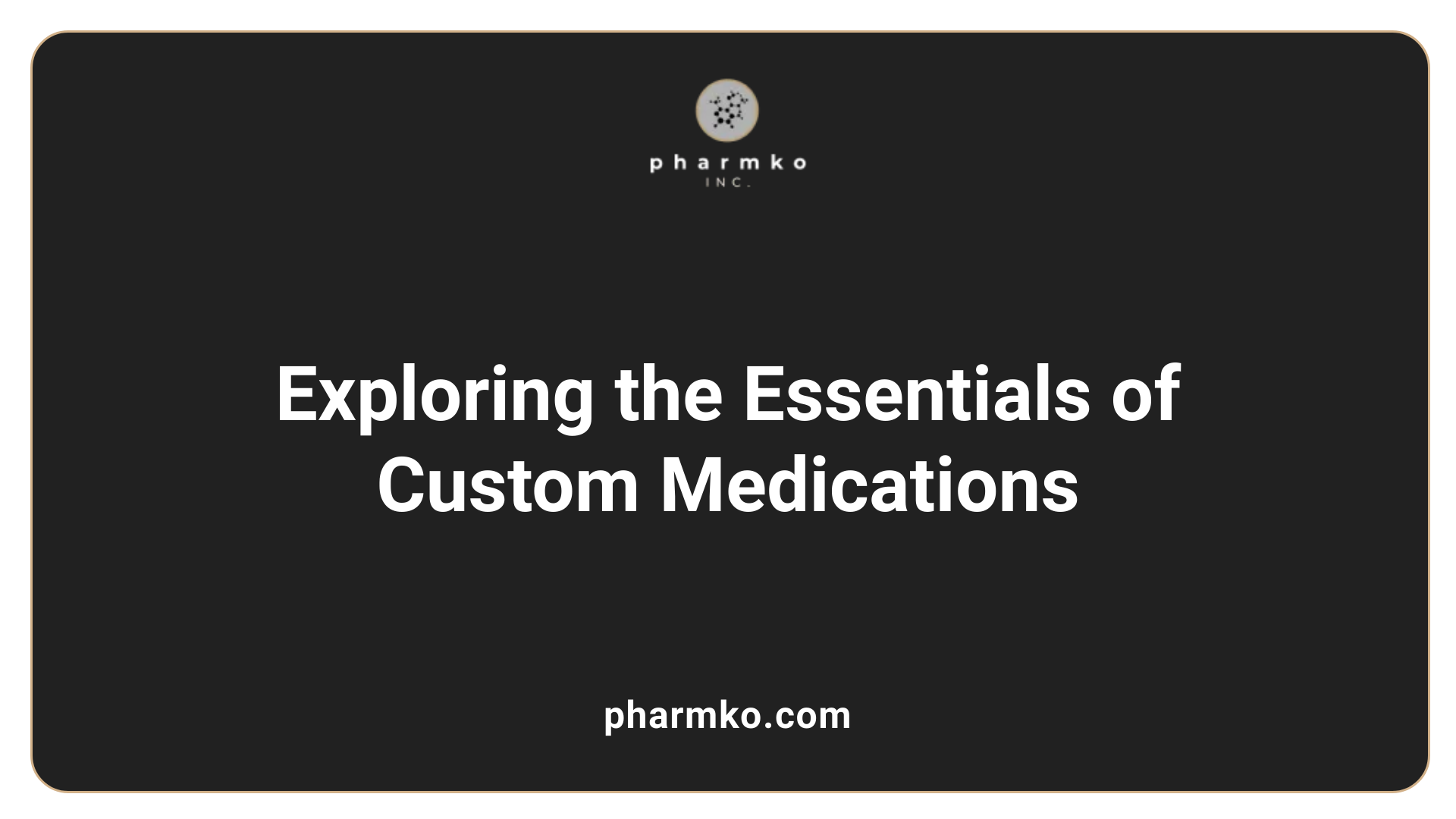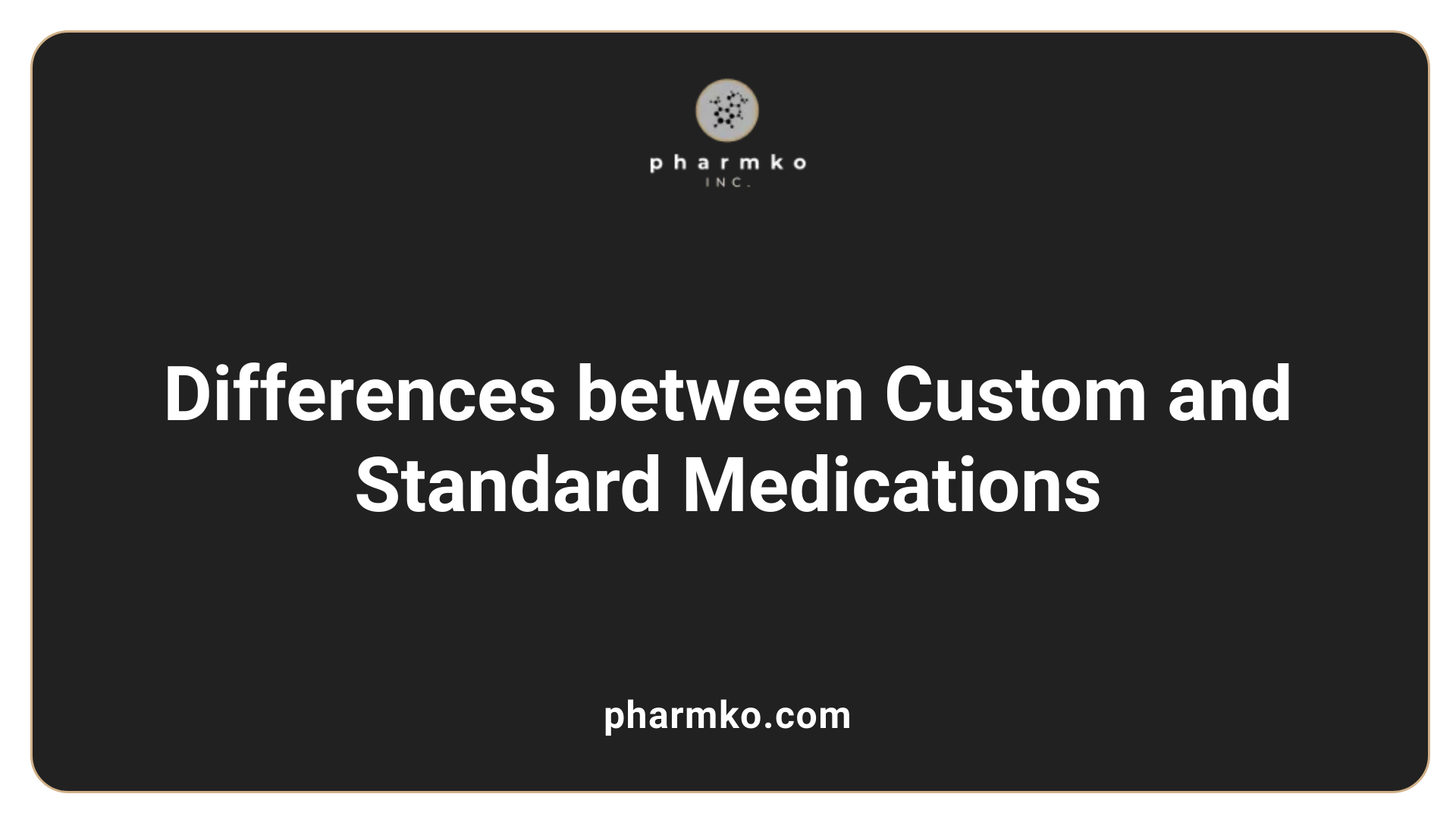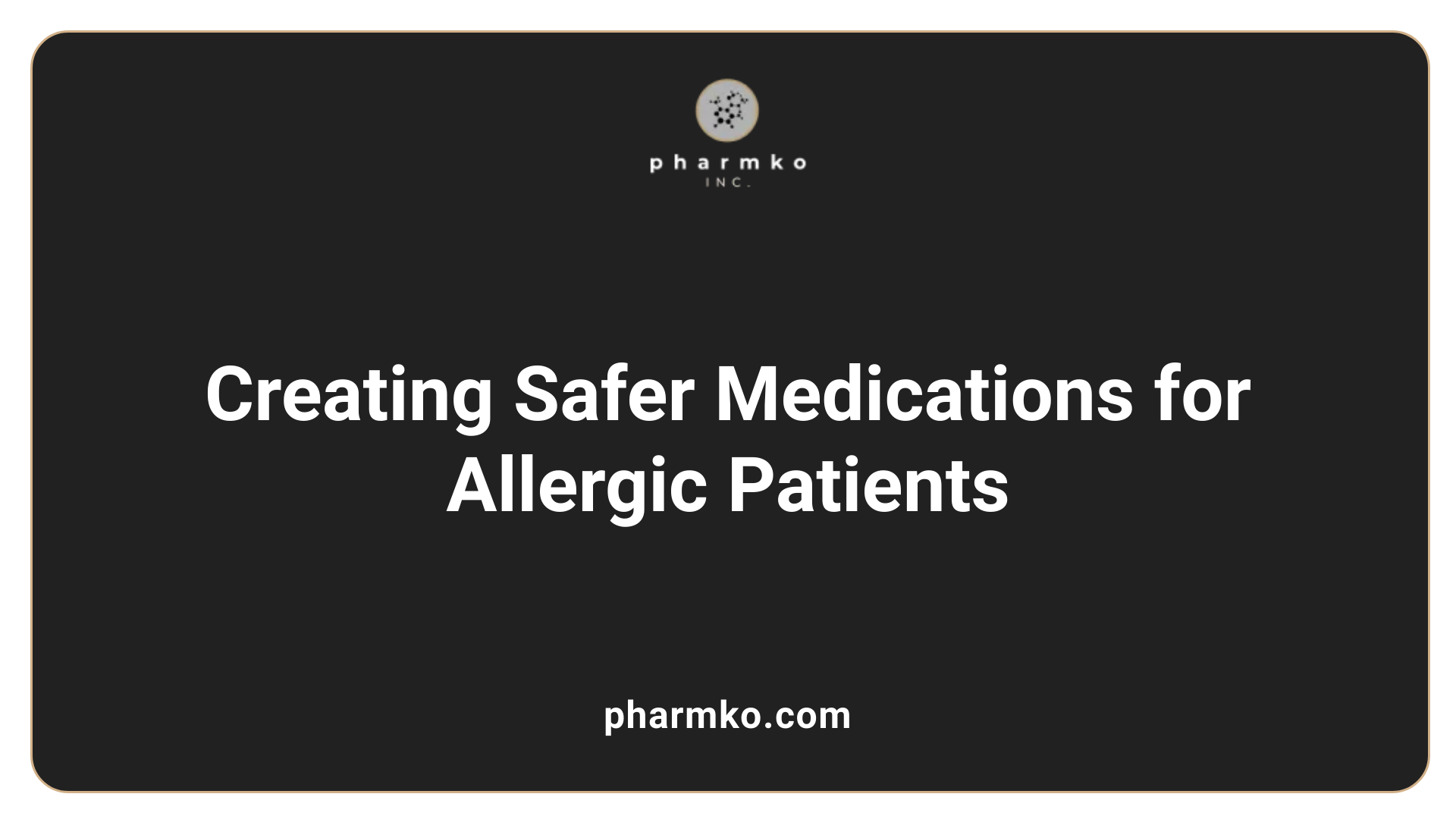What benefits do custom medications offer patients?
Unlocking Personalized Care
In the evolving landscape of healthcare, custom medications are emerging as a crucial component that redefines patient-centric treatment approaches. By precisely tailoring pharmaceuticals to meet individual patient needs, custom medications ensure that a broad spectrum of health challenges can be addressed effectively and safely. This personalized method stands in contrast to one-size-fits-all solutions, offering significant advantages that contribute to improved health outcomes and patient satisfaction.
Understanding Custom Medications

What is a custom medication?
A custom medication is a unique formulation created by compounding pharmacists to tailor specific active ingredients and strengths to meet the individual needs of a patient. This personalized approach focuses on addressing specific symptoms and health challenges, which may not be effectively managed by standard commercial medications.
For instance, medications can be compounded without the use of additives, fillers, or preservatives, ensuring a purer product. Companies like Allermi specialize in providing custom solutions for various symptoms such as nasal congestion and allergies.
Individualization of treatment plans
Custom medications emphasize individualization of treatment plans by considering factors like allergies, dosage forms, and patient preferences. This means tailoring medications for individuals, such as creating flavored liquids for children or individuals with sensitivities to taste, thereby improving medication adherence.
For patients who cannot swallow pills or have feeding tubes, compounding allows medications to be transformed into manageable forms, like liquids or topical applications.
Moreover, for those facing medication shortages, compounding pharmacies can provide access to rare or discontinued medicines, ensuring continuity of care. Through this patient-centric approach, compounding pharmacists foster stronger relationships with patients, further enhancing personalized care and improving overall health outcomes.
Enhancing Treatment Through Personalized Dosages

Adjustable Dosages for Children and Elderly
Custom medications provide a significant benefit through adjustable dosages tailored to the unique needs of different patient populations, particularly children and the elderly. For children, compounded medications can be made in flavored liquids or other manageable forms, making it easier for caregivers to administer necessary treatments. This approach not only increases adherence but also minimizes the risk of side effects by ensuring accurate dosing based on body weight and individual requirements.
Elderly patients often require specialized dosages to accommodate reactions to standard medications, such as sensitivities or slower metabolism. Compounding pharmacists can create medications that suit their specific needs—whether it’s reducing strengths or altering forms to easier-to-take liquids or transdermal patches, which enhances their overall compliance with treatment regimens.
Consistency in Drug Compounding
The compounding process ensures that medications are prepared with precision, allowing for consistency in dosages and formulations tailored to the patient's health condition. This is especially critical in chronic disease management or when standard medications are ineffective. By maintaining stringent quality controls during the compounding process, pharmacists can assure safety and reliability in each tailored medication they provide, ultimately leading to better health outcomes.
Advancing Medication Compliance

Importance of patient adherence
Medication compliance, or adherence, is essential for achieving optimal health outcomes. When patients adhere to their prescribed treatment regimens, the benefits are substantial. This not only leads to a reduction in symptom recurrence but also minimizes the rate of hospital visits, enhancing the overall quality of life. Noncompliance can result in deteriorating health conditions and increase healthcare costs, underlining the need for healthcare systems to address this issue proactively.
Role of custom medications in increasing compliance
Custom medications play a pivotal role in promoting medication compliance, providing tailored solutions for individual patient needs. Here are some key factors:
- Individualization : Compounding pharmacists create medications that meet specific health needs, making treatments more relevant to patients.
- Flavor and Form Preferences : Many compounded medications can be flavored or made into alternative forms such as liquids or creams, catering to patients who struggle with standard dosage forms, enhancing their willingness to take them.
- Allergen-Free Options : For patients with allergies, customized medications can avoid harmful ingredients, ensuring safer treatment and more confidence in taking the medication.
- Dosing Precision : Custom formulations can be made in exact dosages required by patients, reducing the risk of side effects, particularly in vulnerable populations like children and the elderly.
By addressing individual preferences and medical needs, compounded medications significantly contribute to better medication adherence, ultimately leading to improved health outcomes.
Custom vs. Standard Medications: A Comparative Insight

What is the difference between a custom medication and a prepackaged dose?
Custom medications are specially formulated prescriptions designed to address individual patient needs, considering factors such as allergies, sensitivities, and specific dosage requirements. This tailored approach allows healthcare providers to create unique combinations of active ingredients, offering personalized treatment solutions. On the other hand, prepackaged doses consist of standardized medications packaged into ready-to-use units. While they enhance adherence and minimize administration errors, particularly in complex treatments like opioids, they lack the flexibility that comes with compounded medications.
Enhancing Patient Care and Experience
One major advantage of custom medications is their adaptability. They can be created without unnecessary fillers, preservatives, or allergens, ensuring a more pure product. This is especially beneficial for patients with sensitivities or allergies, allowing them to receive effective treatment without adverse reactions. Additionally, customized formulations—such as liquids or topical treatments—cater to patients who struggle with pill-swallowing, increasing the likelihood of adherence.
Safety and Accessibility Considerations
While prepackaged doses provide consistent quality and safety assurances due to stringent regulations in their manufacturing processes, compounded medications offer solutions for those experiencing difficulties finding certain medications, including discontinued or back-ordered products. Moreover, a compounding pharmacist often builds a close relationship with patients, focusing on personal health needs and reducing the risk of harmful drug interactions. This collaborative relationship enhances treatment efficacy and patient satisfaction.
| Aspect | Custom Medications | Prepackaged Doses |
|---|---|---|
| Personalization | Tailored to individual health needs and preferences | Standardized for general use |
| Allergy Consideration | Free from allergens as needed | May contain common allergens |
| Dosage Flexibility | Customized strengths and forms available | Fixed dosages and forms |
| Relationship | Closer ties with compounding pharmacists | Less personal interaction with pharmacists |
| Access to Medications | Solutions for back-ordered or discontinued medications | Limited to available pre-packaged options |
Addressing Allergies and Sensitivities

Formulating Medications Free of Allergens
Compounding pharmacies excel at creating custom medications designed specifically for patients with allergies or sensitivities. This approach enables pharmacists to exclude common allergens such as gluten, lactose, and artificial dyes from the formulations. By tailoring medications to remove these harmful ingredients, compounding pharmacists ensure that patients can safely utilize their prescribed treatments without adverse reactions.
Benefits for Allergic Patients
Custom medications provide significant advantages for allergic patients, facilitating a much safer treatment experience. The ability to modify ingredients means that patients can access medications that might otherwise be unsuitable due to allergies or intolerances. Furthermore, having these formulations designed to meet individual health requirements encourages adherence to treatment regimens, promoting better health outcomes overall.
Ensuring Continuity of Care
Dealing with Medication Shortages
Medication shortages can be a significant barrier to effective patient care. Often, standard commercial medications may become unavailable due to supply issues or discontinuation. Custom medications provide a vital lifeline in such scenarios. Patients relying on specific treatments can have their prescriptions compounded, ensuring that they receive their necessary medications without interruption.
Providing Alternative Solutions Through Compounding
Compounding pharmacies are equipped to create tailored medications that meet individual needs, including those on backorder. This flexibility allows pharmacists to address unique patient requirements, such as adjusting dosages or changing medication forms. For example, patients requiring a specific strength or formulation that is no longer commercially available can continue their therapy seamlessly with compounded alternatives.
The ability to customize medications ensures continuity of care, thereby significantly enhancing patient outcomes.
The Role of Pharmacists in Personalized Medicine
Pharmacist-Patient Relationship
Compounding pharmacists play a crucial role in personalized medicine through their close relationships with patients. This collaboration fosters a deeper understanding of individual health needs, allergies, and medication preferences. By customizing medications, pharmacists can significantly enhance treatment outcomes, ensuring the formulations align perfectly with each patient’s unique requirements. This relationship not only promotes better adherence but also builds trust, allowing patients to voice concerns and discuss their medication regimens openly.
Impact of Tailored Medications on Chronic Disease Management
Tailored medications developed by compounding pharmacists have transformative effects on chronic disease management. By precisely adjusting dosages and eliminating unwanted additives, pharmacists can create effective treatments that address specific health profiles. For instance, patients with sensitivities or those requiring alternative dosage forms benefit immensely, leading to improved compliance. Moreover, such customized medications can pivotally support patients facing medication shortages, ensuring that essential treatments remain accessible. Overall, the ability to tailor medications allows for a proactive approach in managing chronic conditions, enhancing quality of life for patients in need.
Conclusion: The Future of Patient-Centric Care
Custom medications offer innovative solutions in healthcare by adapting to each patient's unique needs. This bespoke approach not only enhances the effectiveness and safety of treatments but also promotes adherence and improves overall patient outcomes. As the move towards personalized medicine becomes more prevalent, custom medications will continue to play a pivotal role in delivering on the promise of individualized healthcare.
References
- Who Benefits from Custom Medication? - Nora Apothecary
- 5 Benefits of Custom Prescriptions - Burt's Pharmacy
- Why choose tailored sterile medications? - Pharmko
- 6 Benefits of Compounding Medications - Carolina Pharmacy
- Unlocking Personalized Healthcare: The Role and Benefits of ...
- The Rising Importance of Compounding Pharmacies ... - Gitlab @ CCI
- Benefits Of Compounding Medication: Why Some People Prefer To ...
- Unlocking the Power of Medication Compounding: Personalized ...
- Personalized medicine could transform healthcare - PMC
- 5 Benefits of Precision Medicine - Reprocell













